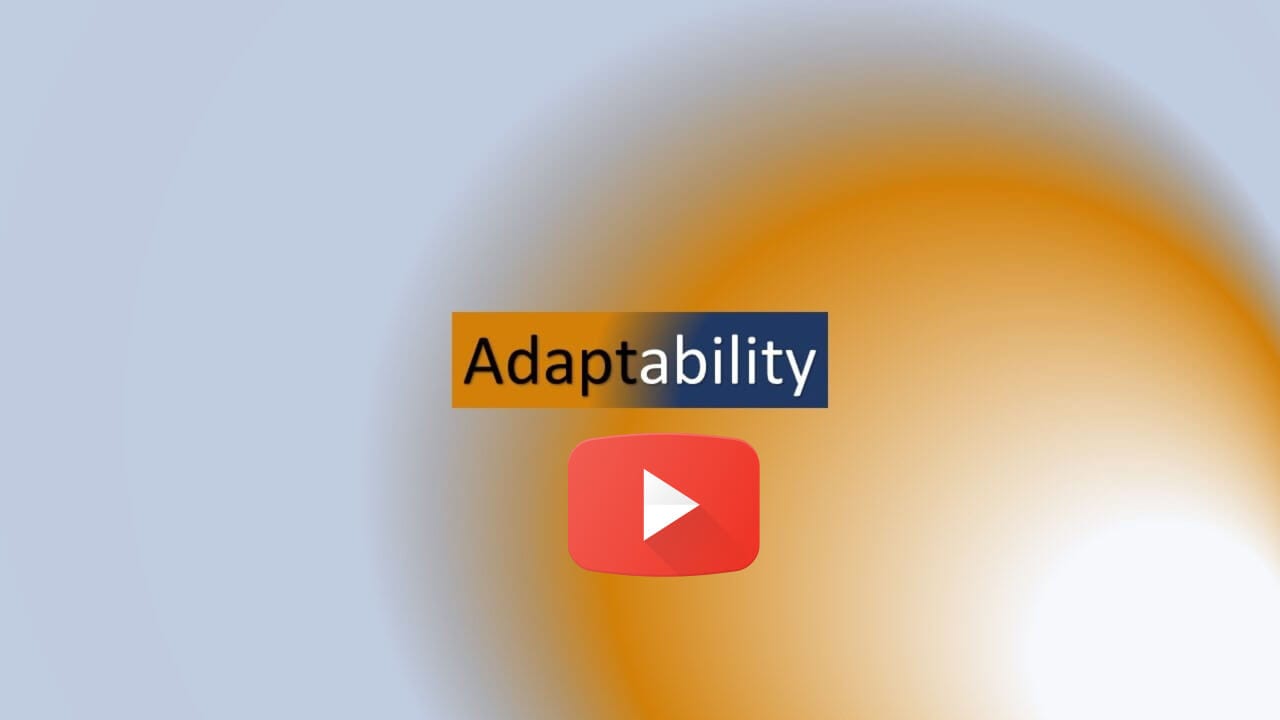What is Mental Flexibility?
R U ADAPTABLE ENOUGH?In a fast changing, uncertain, and complex world (VUCA), our prior mental models, experiences, and even our education are poor guides for good decisions in the future. That doesn’t mean we throw “the baby out with the dirty bathwater,” but learn to question our assumptions and unlearn skills and behaviors that no longer work.
Psychological, or cognitive, flexibility is a fundamental aspect of health. When people possess this type of flexibility, they are more able to manage themselves – positive emotions and well-being – in an unpredictable and uncertain world.
Mental flexibility isn’t just helpful in our personal lives, though. Increasingly, it is a necessary, but short in supply, trait in the workplace. It allows one to see tensions or trade-offs in everyday life as innovative ways to learn and ultimately adapt.
What exactly is mental flexibility, and how can you tell if your employees and job candidates have it?
Let’s take a look at everything you need to know.
What Is Mental Flexibility?
Have you ever caught yourself seeing the world in a way which blinded you to the way it really was. The year 2020 undoubtedly will be remembered for the pandemic. But the most long-lasting impact may be the shift in how white people in America look at race. While white America viewed racial progress through the lens of civil rights and legislation, the reality on the streets and in the workplace was far different. Confronted with the deaths of George Floyd, Breonna Taylor, Ahmayd Arbery and too many others, the worldviews of millions of people were shattered. Making sense of what we see and how the world actually works requires mental flexibility.
As I like to say, mental flexibility is like watching CNN, Fox News and MSNBC at the same time and making sense of what is happening, not confirming our biases. It required two opposing thoughts in our minds at the same time and not have our heads explode!
A more academic approach describes mental flexibility as the ability to change your thinking based on shifting demands or expectations. It also refers to the ability to think about multiple things simultaneously. In more casual nomenclature, you might think of someone who is mentally flexible as having the ability to “see around corners” and “think on their feet.”
Some people might be naturally mentally flexible, while others might have to work at it. When you’re more flexible in your thinking, it can help you better deal with the inevitability of change in life. Mental flexibility allows you to adapt more easily to new challenges and unexpected disruptions that seem to pop up more frequently and intensely.
But being mentally flexible might be easier said than done for a lot of people. Many of us end up “getting stuck” in certain behavior patterns and on certain thoughts.
To be mentally flexible means you are connected with the present. You are self-aware of your thoughts and emotions and acutely aware of others and your environment.
This means fewer surprises and an uncanny ability to roll with the punches better. Without mental flexibility, you might reject the warning signs because they are counter to your expectations.
In short, mental flexibility might be described as open-mindedness on steroids.
Mental Flexibility Boosts Adaptability Quotient
Mental flexibility has been identified as one of five personal abilities that drive something called the “adaptability quotient.” Boosting one’s AQ is essential because adaptability has been identified as one of the top in-demand skills by employers and employees by Linkedin, McKinsey, Deloitte, and the World Economic Forum. The AQai tool measures an individual’s ability to:
- Be change-ready
- Overcome challenges
- Unlearn obsolete behaviors
- Make real-time adjustments to change
People with a high adaptability quotient are open-minded, prioritize developing new skills, invest in their own learning, and actively seek to look at situations from other peoples’ perspectives.
You can learn more about AQ testing here.
Why Is Mental Flexibility Important for the Post-Pandemic Employee?
If an individual is unable or unwilling to respond adaptively to uncertainty, they often succumb to cognitive biases and revert to established mental models. When hiring employees, certain technical and functional job skills are required. But as more and more jobs evolve due to automation and AI, uniquely human skills like critical thinking, collaboration, empathy, and growth mindset – “soft skills” – become more valuable than college degrees and years of experience. Human resources’ own infatuation with education and experience as criteria for hiring and promotion is an example of low mental flexibility.
Up until recently, communication skills were valued as the most important soft skill in recruiting. Communication is still important but now much more complex. It’s not just learning how to use Zoom and Slack that stymied many workers but inflexible mental models. The expectation that remote work would never be as effective as going-to-work was the perfect example of an outdated mental model. The need for adaptability was made incredibly obvious by the recent shift many companies have made from in-office work to remote work. For inflexible individuals who are set in their ways, productivity declined and stress and anxiety consumed their days. For the mentally flexible who adapted to work-from-home, new opportunities opened up, productivity increased, and employee engagement increased.
Business is rarely predictable anymore. This means that even if you hired a person to fill one role, you might have to ask them to do something outside of their job description on occasion or move to a different job entirely. If an employee is mentally flexible, they will be willing, able, and maybe even excited by the prospects of a new challenge.
What Does Mental Flexibility Look Like?
People with high levels of Mental Flexibility thrive on making sense of tension points between ideas. They seek out alternative perspectives and meet challenging demands in creative ways, often finding opportunities hidden within the tension. They feel comfortable with contradictions, ambiguity, and paradoxes and appreciate or even learn from the discomfort of working on multiple objectives simultaneously. They discover new ways of learning and adapting, and are able to effectively flex between competing goals with relative ease.
People with low levels of Mental Flexibility may find themselves living in “Groundhog Day” – problems seem to resurface and replay over and over. They feel constantly “up against it,” compromising their goals and ambitions against competing demands. They often prefer to pursue one clearly defined goal or objective, relying on grit and perseverance alone, to overcome setback after setback. But as the quote attributed to Albert Einstein suggests, “insanity is doing the same thing over and over again and expecting different results.”
Mental Flexibility Is Beneficial to Both Employees and Employers
Being mentally flexible gives you a competitive edge over your peers. When you confront challenges more easily, adapt to your surroundings with ease, and act more effectively in the face of change, you are setting yourself up to grow and shine while others cope and decline.
For the job seeker, demonstrate your ability to be mentally flexible. Share an example of how you discovered an opportunity while others saw only threats. Cognitive flexibility is becoming an increasingly valuable asset, sought by employers, in a world of shifting priorities and perpetual uncertainty. When an employee is able to zig when the world zags, individual adaptability can drive organizational changes, not resist it.
As an employer, it’s also important to demonstrate what it means to be mentally flexible. The only thing certain about our future is that disruptions are inevitable, that demand and supply will fluctuate, that employees will experience significant personal issues, and who knows what else the world will throw at us to test our grit and resilience.
How can mental flexibility benefit the organization? It creates an environment where everyone in the business can feel comfortable approaching both their work and home lives in a balanced, productive way.
For your employees who are reluctant to change, lead by example. Inflexible people might just be stuck and they don’t even realize it. Share a situation where confirmation bias led you to a wrong decision or a mistake and how you learned from it. Mental flexibility requires authenticity and transparency, which builds employee commitment and trust. Mental flexibility helps make sense of the difficult diversity, inclusion, and equity conversations. It encourages empathy and unlearning. It helps build a more robust company culture, which can help you find and keep high-quality talent.

Hiring Employees With Mental Flexibility: What Should You Look For?
When hiring employees (and even coaching current employees), mental flexibility is a key soft skill you will want to keep an eye out for. Organizations need to build mental flexibility into their hiring and management practices. Beginning with the interview, ask job candidates questions that will expose strengths or vulnerabilities in mental flexibility:
- Describe a time when you misjudged a co-worker or a boss.
- What led up to the moment you changed your mind?
- What is something you once believed but no longer do?
- Describe learning a new skill. How did you go about it?
- Describe a mistake you made at work. How did you correct it?
- If a co-worker can’t stand you, what do you do?
People are always trying to put their best foot forward, to make themselves as appealing as possible when applying as a candidate for an open position. This means that the answers you get from them during the interview process in regards to how they deal with change might not actually reflect what they will be like as employees.
How can you overcome this challenge?
One of the best ways is with pre-employment tests and adaptability quotient assessments. Validated psychometric testing reveals an individual’s hardwiring – how they prefer to approach people and solve problems. These assessments allow you to focus on differences between what the candidate shared with you and how they are likely to perform. You can test for mental flexibility, open-mindedness, grit, resilience and more. At Success Performance Solutions, you can even custom build your own pre-employment test to fit the needs of your company. Among the hundreds of traits and abilities you can test for, mental flexibility is one of them.
Is your current workforce gritty and resilient enough to adapt as quickly as your company needs them? Check out our revolutionary AQai.

